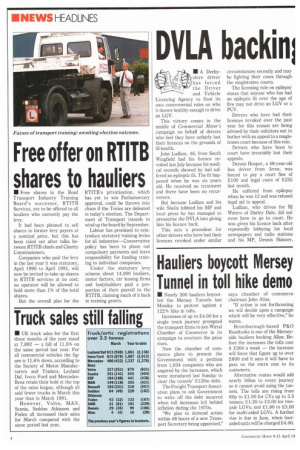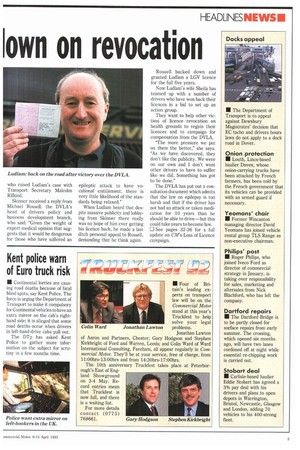DVLA backinl own on revocation
Page 6

Page 7

If you've noticed an error in this article please click here to report it so we can fix it.
• A Derbyshire driver has forced the Driver and Vehicle Licencing Agency to flout its own controversial rules on who it deems healthy enough to drive an LGV.
This victory comes in the middle of Commercial Motor's campaign on behalf of drivers who feel they have unfairly lost their licences on the grounds of ill-health.
John Ludlam, 46, from South Wingfield had his licence revoked last July because his medical records showed he had suffered an epileptic fit. The fit happened when he was six years old. He received no treatment and there have been no recurrences.
But because Ludlam and his wife Sheila lobbied his MP and local press he has managed to pressurise the DVLA into giving him his licence back.
This sets a precedent for other drivers who have had their licences revoked under similar circumstances recently and may be fighting their cases through the magistrates courts.
The licensing rule on epilepsy states that anyone who has had an epileptic fit over the age of five may not drive an LGV or a PCV.
Drivers who have had their licences revoked over the past year for this reason are being advised by their solicitors not to bother with an appeal to a magistrates court because of this rule.
Drivers who have been to court have invariably lost their appeals.
Dennis Hooper, a 48-year-old bus driver from Avon, was forced to pay a court fine of £100 and legal costs of £235 last month.
He suffered from epilepsy when he was 12 and was refused legal aid to appeal.
Ludlam, who drives for BJ Waters of Darley Dale, did not even have to go to court. He was given his licence back after repeatedly lobbying his local newspapers and radio stations and his MP, Dennis Skinner, who raised Ludlam's case with Transport Secretary Malcolm Rifkind.
Skinner received a reply from Michael Rossell, the DVLA's head of drivers policy and business development branch, who said: "Given the weight of expert medical opinion that suggests that it would be dangerous for those who have suffered an epileptic attack to have vocational entitlement, there is very little likelihood of the standards being relaxed."
When Ludlam heard that despite massive publicity and lobbying from Skinner there really was no hope of him ever getting his licence back, he made a last ditch personal appeal to Russell, demanding that he think again. Rossell backed down and granted Ludlam a LGV licence for the full five years.
Now Ludlam's wife Sheila has teamed up with a number of drivers who have won back their licences in a bid to set up an action group.
They want to help other victims of licence revocation on health grounds to regain their licences and to campaign for compensation from the DVLA.
The more pressure we put on them the better," she says. As we have discovered, they don't like the publicity. We were on our own and I don't want other drivers to have to suffer like we did. Something has got to be done."
The DVLA has put out a consultation document which admits that the law on epilepsy is too harsh and that if the driver has not had an attack or taken medication for 10 years than he should be able to drive—but this could take years to become law. El See pages 32-36 for a full update on CMs Loss of Licence campaign.




























































































